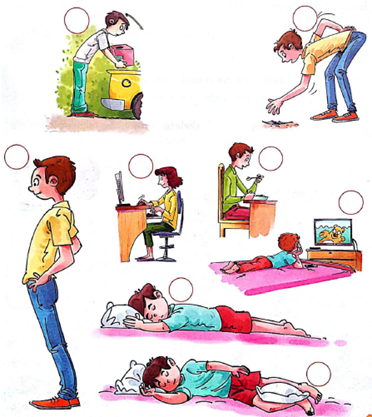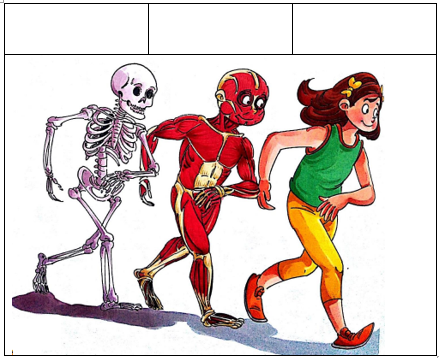~*Happy New Year 2023*~
Thank you for using my blog!
~~*~~
Q 1. Draw line from each
word to the correct part of the body.
Q 2. Write the color of
eyes that you have seen or known.
Ans:
Q 3. Write the names of
shapes for the given eyes. Hint: Round, Almond, Droopy, and Long
Q 4. Write the names of
shapes for the given faces.
Hint: Long, Round,
Square, Triangle, Heart, Oval.
Q 5. How will you tell
the size of hairs? Tick the options.
|
|
Long
|
|
|
Tall
|
|
|
Short
|
|
|
Small
|
Q 6. How will you tell
your height compared to your friend? Tick the options.
|
|
Long
|
|
|
Tall
|
|
|
Short
|
|
|
Small
|
Q 7. Write the types for
given hairs. Hint: Straight, Curly, Silky, Rough
Q 8. Write the names of
shapes for given shapes of nose. Hint: Pointed, Broad, Flat.
Q 9. What is shape of
following face?
Ans:
Q 10. Fill in the words
using vowels.
Q 11. Complete the table
below looking at your body parts.
|
Name
|
|
|
Height
|
|
|
Weight
|
|
|
Body Part
|
Shape
|
Color
|
Count
|
Size compared to your best friend
|
|
Face
|
|
|
|
|
|
Eyes
|
|
|
|
|
|
Hairs
|
|
|
|
|
|
Nose
|
|
|
|
|
Q 12. Write the body
parts in alphabetical order.
|
Starting with
|
List of Body Parts
|
|
A
|
|
|
B
|
|
|
C
|
|
|
D
|
|
|
E
|
|
|
F
|
|
|
G
|
|
|
H
|
|
|
I
|
|
|
J
|
|
|
K
|
|
|
L
|
|
|
M
|
|
|
N
|
|
|
O
|
|
|
P
|
|
|
Q
|
|
|
R
|
|
|
S
|
|
|
T
|
|
|
U
|
|
|
V
|
|
|
W
|
|
|
X
|
|
|
Y
|
|
|
Z
|
|
Q 13. Describe the
picture shown below. First tick the correct option and later write paragraph in
space given below. In a similar way describe your face.
Q 14. How these two
persons are different?
Ans:
Q 15. What are called
living things?
Ans:
Q 16. Write four living
things.
Ans: 1.
2.
3.
4.
Q 17. What are called
non-living things?
Ans:
Q 18. Write four
nonliving things.
Ans: 1.
2.
3.
4.
Q 19. Name the three
groups of living things shown in picture below.
Ans: 1.
2.
3.
Q 20. Circle the living
things.
Q 21. Complete the table
with Yes/No.
|
|
Living things
|
Nonliving things
|
|
Eat and Drink
|
|
|
|
Breathe air
|
|
|
|
Grow
|
|
|
|
Move on their own
|
|
|
|
Feel
|
|
|
|
Die
|
|
|
|
Reproduce young ones
|
|
|
Q 22. Classify them in
living and nonliving.
Q 23. Write what living
things can do and what nonliving things cannot do.
Ans:
Q 24. What are called
external organs?
Ans:
Q 25. Write your external
organs.
Ans:
Q 26. Join the body
parts.
Q 27. Identify the body
part and name the parts numbered.
Ans: Name of the body
part:
Q 28. Name the external
organ.
|
Helps me to smell
|
|
|
Helps me to see
|
|
|
Helps me to hear
|
|
|
Helps me to feel
|
|
|
Helps me to write
|
|
|
Helps me to walk
|
|
|
Helps me to eat
|
|
|
Helps me to turn my head left and right
|
|
|
Helps us to hold things
|
|
|
Helps to speak
|
|
Q 29. Write the correct
spelling of following body parts.
Q 30. What are called
internal organs?
Ans:
Q 31. Write your any ten
internal organs.
|
1
|
|
|
2
|
|
|
3
|
|
|
4
|
|
|
5
|
|
|
6
|
|
|
7
|
|
|
8
|
|
|
9
|
|
|
10
|
|
Q 32. Circle the internal
organs.
|
Tongue
|
Face
|
Head
|
Brain
|
|
Brain
|
Ears
|
Lungs
|
Eyes
|
|
Nose
|
Skin
|
Mouth
|
Neck
|
|
Shoulder
|
Stomach
|
Heart
|
Chest
|
|
Kidney
|
Hands
|
Elbow
|
Toes
|
|
Palm
|
Fingers
|
Waist
|
Legs
|
|
Knees
|
Feet
|
Muscle
|
Nails
|
Q 33. Circle the external
organs.
Q 34. Write the names of
internal organs.
Q 35. Match the
following.
Q 36. Complete the
following table looking at picture of internal organ.
Q 37. What covers our
bones and gives shape to our body?
Ans:
Q 38. Name two internal
organs inside chest.
Ans: 1.
2.
Q 39. Name two internal
organs near abdomen.
Ans: 1.
2.
Q 40. Name two internal
organs which are above neck.
Ans: 1.
2.
Q 41. How many senses
human have?
Ans:
Q 42. Write the names of
five sense organs.
Ans: 1.
2.
3.
4.
5.
Q 43. Complete the
following table.
|
Sense
|
Sense Organ
|
Internal/External
|
|
Taste
|
|
|
|
Smell
|
|
|
|
See
|
|
|
|
Hear
|
|
|
|
Touch / Feel
|
|
|
Q 45. Fill in the blanks.
My _______________ can
see the big bright sun.
My _______________ can
smell hot cinnamon buns.
My _______________ can
hear the big loud drum.
My _______________ can
taste good things.
My _______________ can
feel the sand.
Q 46. Complete the
following table.
Q 47. Match the
following.
Q 48. Name the internal
organ.
|
Helps me to taste different food items
|
|
|
Helps me think
|
|
|
Helps me breathe
|
|
|
Pumps blood to all of the body parts
|
|
|
Helps to digest food
|
|
|
Filters the waste of the body
|
|
|
Helps me move around
|
|
|
Gives shapes to our body
|
|
|
Helps to chew food
|
|
Q 49. What is called
joint?
Ans:
Q 50. Name any three
joints that you know.
Ans: 1.
2.
3.
Q 51. How does joint
helps?
Ans:
Q 52. Match the joint
name to the correct dots in the following picture.
Q 53. What is called
posture?
Ans:
Q 54. What happens
because of wrong posture?
Ans:
Q 55. What should be
straight when you sit in upright position?
Ans:
Q 56. Who is flexible
machine or human?
Ans:
Q 57. Tick the right
posture and cross the wrong.
Q 58. Name three internal
organs and body parts which together helps us to move and bend.
Ans: 1.
2.
3.
Q 59. What is called
skeleton?
Ans:
Q 60. Write four external
organs which are in pair.
Ans: 1.
2.
3.
4.
Q 61. Write two internal
organs which are in pair.
Ans: 1.
2.
Q 62. Name the pictures
shown below
Q 63. Circle the organs inside head.
Q 64. Circle the organs
inside your chest.
Q 65. Circle the organs
inside the abdomen.
Q 66. Circle the right
posture in each pair of pictures.

Q 67. Match the body
movement.
Q 68. Circle the odd one.
Kidney, Stomach, Heart,
Chest
Head, Brain, Tongue,
Teeth
Lungs, Muscle, Skin, Kidney
Legs, Stomach, Feet, Chest
Eyes, Ears, Kidneys,
Heart
Heart, Taste, Think,
Pumps
Bend, Move, Lungs,
Breathe
Filter, Taste, Kidney,
Move
Brain, Think, Digest,
Taste
Q 69. How will you use
sense organs to know about a mango?
What is it?
Ans:
How do you know?
Ans:
Which organ helped you to
identify it?
Ans:
Which other organs you
can use to tell more about it?
Ans:
Q 70. How will you use
sense organ to know about an alarm clock?
What is it?
Ans:
How do you know?
Ans:
Which organ helped you to
identify it?
Ans:
Which other organs you
can use to tell more about it?
Ans:
Q 71. What are two groups
of human body parts?
Ans:
Q 71. Write True or
False.
Human and robot have same
parts.
Shape of face, eyes and
nose for all humans is same.
Straight, curly, silky
and rough are the types of hairs.
We have many body parts.
We have one pair of head.
We walk with your legs.
We can fly with our
hands.
Nonliving things are
man-made as well as natural.
Robot is living thing.
Person, Animals and
Plants are living things.
Organs which we can are
called internal organs.
Organs which are inside
our body and which we cannot see are called external organs.
Head is example of
external organ.
Skull is example of
internal organ.
There are six senses and
organs.
Heart is inside chest.
Herat filters blood and
removes waste.
Lungs helps to breathe.
Head helps humans to
think.
Tongue helps to taste the
food and stomach helps to digest the food.
Kidneys are at the back
of abdomen and filters the waste of body.
Muscles and bones helps
to move.
Skin is the largest sense
organ.
Skin is internal organ.
Muscle gives shape to the
body.
Place where two or more
bones join are called joint.
The position in which we
sit, stand, walk or sleep is called posture.
Human body is flexible.
Wrong postures can harm
body in long run.
There are some correct
postures and some wrong postures.
Sitting an upright
position keeps your backbone straight.
Bone, joints and muscle
help us move and bend.
Framework of bone is
called skeleton.
Skin is under our muscle
and over our bones.
Q 72. Fill in the blanks.
Every human have similar
________________ parts.
Person can have heart _______________
face.
Person can have curly
_____________.
Person can have pointed
_____________.
We have ____________ of
legs, hands, eyes and ears.
We have ______________
body parts.
We use ______________ for
writing.
_______________ things
eat, breathe, grow move, feel and also die.
Humans, animals, bird and
_____________ are living things.
The parts which you can
see are called __________________.
The parts which are
inside body are called _______________.
Tongue is inside
_____________ and helps to ____________ food.
____________ is inside
head and helps to ______________.
Lungs are inside
____________ and helps to ______________.
___________ is inside
chest and it pumps ______________ to all the body parts.
Stomach is inside
_____________ and it helps to _____________ the food.
_____________ are at the
back abdomen and ______________ the waste of the body.
________________ and
_______________ helps us to move.
_______________ helps us
to smell.
_______________ helps us
to see.
_______________ helps us
to feel.
_______________ helps us
to hear.
The place where two or
more bones join are called ___________________.
The position in which we
sit, stand, walk or sleep is called ________________.
Human body is very
__________________ and we can _____________ it in different ways.
There are some
______________ postures and some _____________ postures.
The wrong postures can
_____________ the body in a long run.
Sitting in upright
position keeps our _________________ straight.
________________ are
under our skin and over our bones.
Framework of bone inside
us is called a ___________________.
Visit My Daughters YouTube Channel - Things We Love






























